 newsitems
newsitems  Sarkozy chairing 1st G-20 meeting urges Action on Monetary + Food Rules for World Economy Recovery
Sarkozy chairing 1st G-20 meeting urges Action on Monetary + Food Rules for World Economy Recovery
Sarkozy chairing 1st G-20 meeting urges Action on Monetary + Food Rules for World Economy Recovery
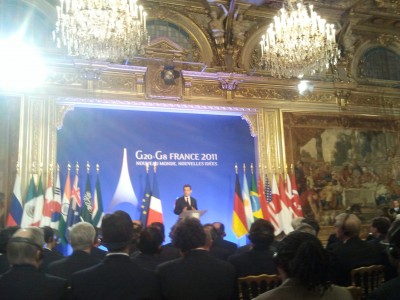
*Paris/Elysee Palace/Angelo Marcopolo/- Welcoming the 1st G-20 meeting in 2011 of Economic Governance Elite from 25 Countries totalling "85% of World's GDP" and Heads of relevant International Organizations (IMF, World Bank, OECD, UN, EU, etc), at a crucial juncture for World Economy's Recovery "after the worst Global Crisis of the last 60 Years", and while Popular uprisings pop up throughout the surounding Mediterranean and Middle East areas, in an explosive Mix of aspirations for Democracy and against Poverty, the incoming G-8 and G-20 Chairman, French President Sarkozy, warned that World's Public Opinion will judge severely if they fail to advance at least on "essential" issues such as Monetary and Food (Raw Materials) stability, necessary for a sustainable, strong and balanced Growth.
Appearing decided to make any useful proposal able to overcome eventually blocking discords, Sarkozy even added orally to his initial draft speech the idea for most G-20 Countries which agree together on a key point, to advance forward, without being obliged to wait for those who hesitate or obstruct a deal, so that a breakthrough, beneficial to Global Recovery, could be created by a kind of World's avant-guard. Above all, what counts most, is "not to be confused into never-ending discussions about those "Indicators" (NDLR : of Imbalances in economic relations, f.ex. in Foreign Trade, Exports; Accounts, etc), which would deviate us from what is Essential". Because "Nothing would be worse than to refuse to deal with the Real Issues, .. such as the Monetary World order, and the Volatility of Raw Materials" (such as Oil and Food, etc), Sarkozy clearly stressed, almost warning that the recent Hunger riots revealed the "No 1 Risk", (See infra).
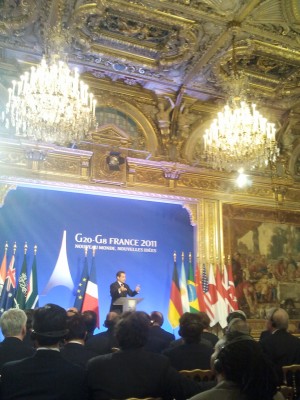
- "Therefore, it's our Responsibility, and that of Heads of State and Government" of the G-20, "to bring Responses to the Big Questions raised Today in the Global Economy", the French President stressed, warning that "there are Hundreds of Millions of People Worldwide who have their eyes turned upon us wondering whether we shall succeed to advance, or not, particularly on the most important Issues" (See supra). "'By chosing an Ambitious Agenda, we chose to be Careful", simply because, given the circomstances, it would have been irreponsible not to set Ambitious targets in front of today's challenges. At any case, "we don't have the right to fail, nor to ignore the "Red Lines" of each other", being obliged to find solutions, in one war or another, particularly when the eyes of International Pubic Opinion are turned towards us", Sarkozy concluded, applauded.
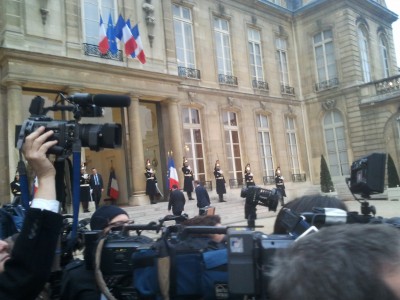
- "Since last year, the Recovery was restored", "faster than scheduled", "but unequal according to Geographic areas, Global Growh isn't yet enough in order to bring substantial drops in Unemployment", while, the experience of the Crisis showed that International Coordination is the only way allowing to renew with a High Level of Growth", so that "Coordination became a Duty", he observed.
- "Our 1st Duty, as G-20 Chair, is to implement the Decisions already taken earlier, .. in particular by the Corean Presidency (2010)", and there where G-20 has already done a "considerable" work, as "on Financial Regulation". Because "our Citizens are Questioning the Reality of our action : It must be clear that we won't accept, anymore, that the practices which led us to the Crisis restart again : There won't be any come-back of "Business as Usual", Sarkozy warned, citting, f.ex., the issue of "Bonus", etc., and asking for "all Financial centres" to "apply the decisions we took at Pittsbourg's earlier G-20 Summit, and to make sure that we have a "spotless Financial Regulation".
- "Another great Acquis of G-20 is the Coordination of Economic Policies", where, "if we don't do anything, then, Global imbalances will deepen again". "Even if it's more Difficult to find a Consensus in times of Recovery", when "the temptation to give Priority to National Interests is big", "But that would bring the Death of G-20", he warned, calling to stick to the agreed "Framework for a Sustainable Growth", instead. In order to "advance on the Mandate entrusted by Heads of State/Government" at "Seoul" (South Korea), Therefore, "tomorrow (Friday) morning you shall debate on the common Indicators of Imbalances, in order to better focus on the Corective Measures that each one has to take in order to re-equilibrate growth";
+ But, what is "essential" is to deal with "the Real Issues", as the "Monetary" global governance and the "Volatility of Raw Materials' Prices", which need our "mobilisation", "in face of 2 Dangers against Growth", Sarkozy alerted (comp. supra) :
(a) The "1st Risk", are "inflationary trends, pushed by Raw Materials' Prices' augmentation", which "are both an Economic issue, which threatens the on-going Recovery, a Social issue, risking Hunger Riots, and a Development issue, for the poorest countries", he made it clear.
This is not against Market Economy, because there is No Market without Rules, but only the Law of the Jungle, explained the Center-Right politician, "proposing a Global Strategy with the Ambition to struggle against Volatility" of Prices, "to Regulate the Derivates' Market, to augment the Transparency of Physical Markets, and to Strengthen Food Security".
Already, in addition to EU Parliament, this same week in Strasbourg (See previous "EuroFora"'s NewsReport), also "the World Bank", chaired by American "Robert Zoelick" (chosen by former U.S. President George W. Bush), and even "the UNO", from the UN Development program Administrator "Helen Clark", (both present in Paris), up to the UN Rapporteur on the "Human Right to Food", (See previous "EuroFora" NewsReport"), etc., "have made Interesting Proposals, that G-20 must take over", Sarkozy observed.
Moreover, "I am strongly convinced that, going well beyond the Immediate Measures that we can propose (i.e. to prevent Hunger Riots, etc), we must also rehabilitate Peasants' role in our Societies", the French President highighted.
(b) "2nd Risk : "Currencies' Volatility and Capital Movements : The Reform of the Monetary World Order cannot wait no more", the incoming G-8 and G-20 Chairman stressed.
- "It's not about any kind of Ideology, nor against anyone", pointed out Sarkozy, anouncing also that "the Chinese Government invites us to Shen Zhen" on March "in order to reflect on this issue, in the framework of a Seminar" open to Wider participation.
- "I'm convinced that the Emergence of New Economic Powers will inevitably lead to the emergence of New World Currencies", the French President explained, warning that "the on-going Transition can be a factor of Instability", as "it's already the case on Capital flux, more and more Volatiles, Currency Stocks, which are reaching exceptional Levels, and on offers of reserve assets", etc.
- "In all these areas, you (G-20) should be able to work on the Rules of the game, which impies that IMF will have Strengthened Monitoring tools and powers", considering also that, "at the Heart of (G-8 + G-20 French Presidency's proposals lies the Ambition to Strengthen IMF's role, which must become, more than ever, the Corner-Stone of International Monetary cooperation", Sarkozy pointed out.
- Already, IMF and G-20, etc. are among the Basis of what could become the New Global Economic Governance in the Future, he observed, while anouncing that, "for 2011, it's essential for us to agree on a Work Program, and on the First concrete Reforms".
----------------
Last but not least, "on Development issues, which have become part of G-20's Agenda since the Seoul summit (2010)", which gave also "a mandate on the UN Report on Funding the fight against Climate Change", (in the logic of UNO's Copenhagen Summit of 12/2009 : Comp. "EuroFora"s NewsReports from the spot),
as he reminded, the French President cited 3 Points :
- "We've set up a High-Level Panel on Infrastructures, in order to act in the Long term", and "it will be for the Cannes' (G-20, November 2011) Summit, to identify ... the Infrastructure Projects and their Funding, as well as to take commitments for their realization", he anounced.
- "On the Short term, I'd ask you to stand Ready to act in order to help our Tunisian and Egyptian friends, on the road towards Democracy and Economic/Social progress", so that "a Succesful Transformation on which Tunisia and Egypt are committed, would also be our succes, as G-20", Sarkozy pleaded.
- But, considering "the question of (Financial) Means to be dedicated for Development", things look nasty : - "Almost all our Budgets are in Deficit, but we have undertaken certain Commitments, and we mustn't fail to fulfill our Promisses. What can we do ?", he wondered.
"This question inevitably raises that of Innovative Funding", where "I'm convinced that even the sightest Tax on Financial Transactions, would be both Just, Useful and Efficient", even if "this raises a lot of Opposition", so that he also suggested that willing Countries advance forward, even if some others hesitated, and expressed "the wish to Debate on that" : "Several Countries have already adopted" IFs, and "I confirmed to Bill " ... a Mission on Development Funding, both with necessary Public Aid, and with Innovative Funds, in order to present his Conclusions to the Heads of State and Government at the Canne's (G-20) Summit", on November, he anounced, inviting to "start with an open mind the Debate that will launch Christine Lagarde tomorrow", because "the World expects from the International Community to keep its Promisses".
------------------
Concluding on a Strategic point, the incoming G-8 + G-20 Chairman stressed that, "in order to realize those Priorities, we must also adapt the Global Governance to the new World and the challenges of the 21st Century : "
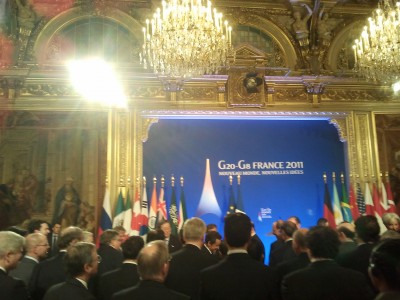
- That's why "we created the G-20, at a 1st stage", and "revised" the role of IMF and World Bank". But, "to advance further, we need more reactive, more coherent and more Representative Organizations", he explained. F.ex., if the IMF is to become a Regulatory body, then, the question of its Reform will be inevitably raised", Sarkozy concluded his speech, before greeting the participants, one by one, and unexpectedly walking right in front of a surprised "EuroFora".
----------------
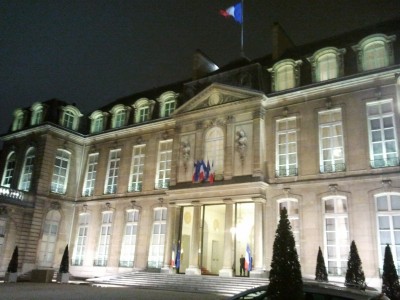
- "'Experts will start now Drafting a global Deal, working probaby overNight, while anything may change the sirtuation up to the last minute", i.e. until tomorrow, Saturday afternoon, a Spokesman from the chairng French Finance and Economy Ministry warned "EuroFora", while Finance Ministers, Central Bank Governors and International Organizations' Heads were leaving an adjacent building at Elysée Palace after a Reception hosted by President Sarkozy and a Working Diner with French Economy Minister Lagarde, at precisely 9.30 p.m. local time (Greenwich +1).
---------
- "The most important issues seem, indeed, to be those of Monetary and Food (raw materials) governance, but, in fact, there is a larger scope which should better be examined with the speciaists of the (chairing) Economy Ministry", pointed out to "EuroFora" an experienced Sarkozy's counsellor.
-------------------------------------------
Brazil's especially negative stance against regulating Raw Materials, and in particular of Agricultural products, mainly Food, (only partially shared by Argentina, who seems, in fact, more interested in Metals, such as Copper, etc), appears Difficult to explain with legitimate motifs :
As reported by Brazilian sources, it consists to claim that those who ask to regulate Food prices wouldn't mind if they fell down, being concerned only when they rise, and that, at any case, this problem could be settled by more Investment to Agricultural production.
But this obviously doesn't explain why Brazil, at least, doesn't ask to regulate both abnormaly High and abnormaly Small Prices of Agricultural Products, so that it could find a guarantee against a subsequent eventually "low" period in the markets. Moreover, it doesn't explain how People will be able to Invest in Agriculture, as it says, without even being able to seriously calculate costs and benefits because of unpredictable and excessive price variations,...
So that Brazilian Government's negative stance against Food Price's regulation inevitably appears either as shortsighted or as hidding, perhaps, another, non-explicitated, real motivation, "EuroFora" was obliged to conclude, after a short but clear Dialogue with Brazilian sources.
------------------------------------------------
Meanwhile, if it were to judge by appearances, ... Fed's Chief Bern Bernanke, curiously always late both to arrive and to leave from Elysee Palace (may be because having to deal with several issues in depth), appeared changed : Smiling and surrounded by People at his arrival, Bernanke left, afterwards, alone, avoiding the Press and looking thoughtful...
On the contrary, European Central Bank's chief, Truchet, left Elysée palace in the middle of a group of people, and particularly smiling, even joking with Press Reporters (that he will say "nothing before" tomorrow afternoon's conclusion : Comp. supra).
Could it be, perhaps, also because the French President, learning fast the Copenhagen lesson on how to prevent another kind of eventually blocking "G-2", (as observers named US. President Obama's sudden move, during UNO's Cimate Change Summit on December 2009, to make a "minus" deal with China : See "EuroFora"s NewsReports from the spot), this time took the initiative to agree with "the Chinese Government to invite us (G-20) at the end of March to reflect on... Currencies' volability and Capitals' movements", in "a Seminar widely open to the Academic community and States non-membersto G-20" ?
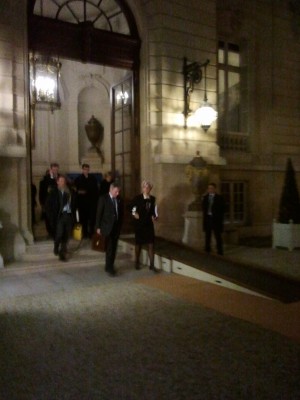
Last, but not least, the organizer and Host of G-20 Finance Ministers and Central Banks' Governors, French Minister of Economy, Christine Lagarde, left later Elysee Palace's area together with a group of collaborators full of documents, finding only a large smile to give to Press Reporters who complained to have stayed "even late Night in the Cold", as an experimented collegue rightfully observed, after patiently waiting for "Hot" News..
Main Menu
Home Press Deontology/Ethics 2009 Innovation Year EU endorses EuroFora's idea Multi-Lingual FORUM Subscribers/Donors FAQs Advanced search EuroFora supports Seabird newsitems In Brief European Headquarters' MAPs CoE Journalists Protection PlatformBRIEF NEWS
- 00:00 - 02.06.2021
- 00:00 - 18.10.2020
- 00:00 - 19.06.2020
- 00:00 - 18.05.2020
- 00:00 - 20.04.2020
- 00:00 - 02.02.2020
- 00:00 - 09.12.2019
- 00:00 - 27.11.2019
- 00:00 - 16.11.2019
Popular
- Yes, we could have prevented Ferguson riots says World Democracy Forum's Young American NGO to ERFRA
- Spanish People Elect CenterRIGHT Majority with 1st Party and Total of 178 MPs (6 More than the Left)
- Pflimlin's vision
- The European Athletic "Dream Team", after Barcelona 2010 Sport Championship Results
- Source Conseil d'Europe à ERFRA: Debatre Liberté d'Opposants à Loi livrant Mariage+Enfants à Homos ?
- Head of BioEthics InterGroup, MEP Peter Liese : "Embryonic stem cell research reaching its END" !?
- Spain: Jailed Turkish Terror suspect with Explosive,Drones,Chechen accomplices stirs Merah+ Burgas ?
- UN Head Ban Ki Moon at CoE World Democracy Forum : - "Listen to the People !"
Latest News
- EUOmbudsmen Conference 2022: Digital Gaps affect People's Trust threaten EF Project on EU Future ?
- French Election : Black Out on Virus, but Obligation for Fake 'Vaccines" Challenged
- Both French Presidential Candidates point at "Humanism" in crucial times...
- France : Zemmour = Outsider may become Game Changer in Presidential + Parliamentary Elections 2022
- PACE President Cox skips Turkey Worst (Occupation) case compared to Russia (DeMilitarisation) query
Statistics
Visitors: 59672872Archive
Login Form
Other Menu
Sarkozy stimulated by Irish "No" challenge : - "It's a call to change and build Europe otherwise. Not later, but now. It won't be easy, but it's fascinating !"
-------------------
* Paris, Elysee, June 14, 2008.
Forthcoming EU Chairman, French President Nikolas Sarkozy, created a surprise by declaring that the challenge of the Irish "No" to the EU Treaty, stimulates his belief that we must immediately change the way Europe is built.
A difficult but fascinating task, that he intends to accomplish in the next 6 Months, during which he will analyse developments 3 times to EU Parliament in Strasbourg, on July, October and December 2008.
But Agenda obliged to give a first reply to Questions raised by the Irish Referendum, on the sidelines of a Press Conference with USA President GWBush, in Paris' Elysee palace, Saturday :
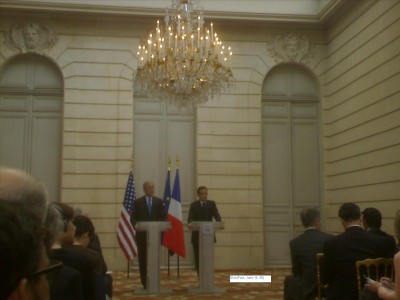
Sarkozy's reply was twofold :
First, the Franco-German position is that EU must make sure "that the Irish Incident does not become a Crisis". Ratification must continue, after 18 EU Member States, also to the rest, as UK Prime Minister Gordon Brown promised.
But, pointing at deeper causes, Sarkozy also criticized bureaucratic "sabotage" of Europe's "founding fathers" original dream. The move reminded his Historic February and July 2007 speaches in Strasbourg on Europe's future, joining criticism to a call for EU's Renaissance, which now became urgent :
(../..)


















